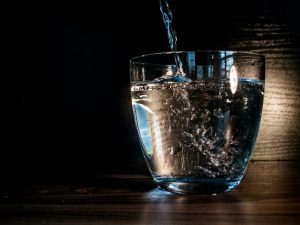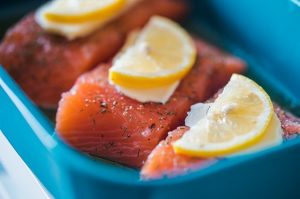So, you say you’re lazy? Alright. At least you admit it. Yes, exercise is still very important to the weight loss process, but if you insist, you can still lose weight if you put your focus on diet first. To achieve medical weight loss, the healthy, nutrition-centered way to reduce weight, there are numerous programs one can follow, and a number of easy-to-follow “tricks” to help along the way.
Here are my top 10 “Lazy Girl” tips to achieve medical weight loss without even breaking a sweat!
 #10 Drink 8 glasses of water per day
#10 Drink 8 glasses of water per day
If anything, at least you can pee out a pound or two. Kidding aside, water is very good for your metabolism and your body will respond positively for you. It lubricates the joints, too. Cartilage is around 80 percent water. It’s not hard to image the joint pain that can come from dehydration, is it? Water, as a substitute for sweetened juices and sodas, can help achieve medical weight loss, and it acts to prevent overeating if you drink some before eating.
#9 Eat spicy food
Let’s make a Thai dish tonight! Yes, spicy foods have been known to speed up your metabolism so add a little cayenne pepper to that dish. Plus, it may be so spicy that you end up eating a little less. Seriously, eating spicy food only once a day was seen to reduce mortality rates by 14%, according to a 2015 study by Harvard and China National Center for Disease Control and Prevention. That’s some hot news if you ask me!
#8 Drink green tea
Green tea is loaded with antioxidants and other substances that help boost your metabolism. Studies have shown that there are active components in green tea that help break down fat. Tea contains inflammation-fighting polyphenols that are also said to aid in fighting cancer.
These amazing polyphenols contain large amounts of a catechin called EGCG. These natural antioxidants assist in preventing cell damage and reduce the formation of free radicals in the body.
 #7 Get better sleep
#7 Get better sleep
For some of you, simply improving your sleep does wonders to your metabolism. Sleep deprivation is a major hindrance to your progress, so improving your sleep habits will really make your metabolism more efficient. A study indicated sleep-deprived people have a bigger appetite and tend to have a higher caloric intake.
Lack of sleep disturbs the daily changes in appetite hormones, which may alter appetite regulation. Not convinced, look into the hormone that stimulates appetite, ghrelin, and the hormone that suppresses appetite, leptin. See for yourself—now get some sleep!
#6 Take Vitamin D
Vitamin D is a common nutritional deficiency in this country, surprisingly, and vitamin D plays a very important role in your metabolism. There are vitamin D receptors on various cells in your body including your brain cells and fat cells. Having an adequate amount of vitamin D can mean the difference between storing fat vs. burning fat.
Vitamin D is produced naturally by the body when exposed to sunlight, and with over 300 sunny days in Colorado annually, it’s hard to believe anyone being deficient. Nevertheless, I recommend taking at least 2000 IU of vitamin D per day. As an added benefit, Vitamin D may also play a role in preventing certain diseases, reducing depression and keeping bone loss minimal as we age. Talk about a natural medical weight loss idea—get outside!
#5 Doubling the Medical Weight Loss with Half the Food
Don’t want to count calories? That’s fine. Try the “Half Method.” Following the half method helps you practice portion control so that you can save yourself the extra 300 calories that you don’t need. A pound of belly fat is about 3500 calories. Cutting an average daily caloric intake of 2500 per day in half would, in theory, wipe a pound of fat away in a few days. Start slowly, halving a meal or a snack here and there, and build up from the small successes.
#4 Eat slowly
Remember it takes your body at least 15-20 minutes to create that beautiful “full” signal to tell you to stop eating. S-l-o-w down and with practice, you will find yourself eating less. Be mindful and be present so that you can calm yourself and eat at a slower pace. Think of each bite as needed fuel for your body, not an unlimited indulgence. Be grateful for each meal.
 #3 Walk more
#3 Walk more
Ok, so I said this was the lazy girl’s guide. I didn’t say you had to go to the gym, but did you know simply by adding another 1000-2000 steps to your day can actually benefit you? You will increase your heart and lung fitness while reducing the risk of heart disease and stroke.
Walking is good for managing high blood pressure, high cholesterol, and muscular pain. Of course, you get to see more than you do while driving and will even have a chance to strike up a conversation with a neighbor. What a concept! Try it out and enjoy developing muscle strength and endurance while reducing body fat.
#2 Take fiber pills
It’s best to get fiber from foods, but who are we kidding, we’re lazy right? So, take fiber pills instead. Fiber helps with digestion and helps with feeling full. Women generally need about 25 grams of fiber per day and men need closer to 30 grams of fiber per day.
Where do you find it, other than in pills? Medical weight loss foods rich in fiber include:
- whole grains (whole-wheat bread, pasta)
- berries (it’s in the seeds and the skin)
- beans (3-bean salad, chili)
- nuts (almonds, pecans, and walnuts are best)
- oatmeal
- vegetables
- brown rice
- bran cereal
- baked potato with skin
And the #1 lazy Medical Weight Loss tip to lose weight is… Eat Fat!
If you want to burn fat, you have to eat fat. Fat is energy and it slows down digestion. The benefit is that it helps you feel full sooner and longer. It shuts off your hunger signal and controls the appetite centers in your brain. Fat also supports a special brain hormone called acetylcholine which is in charge of memory and concentration.
Do you know your healthy fats? In case you’ve never met, here are some to keep as close as a good friend:
 Fish – Salmon, mackerel, herring, sardines, lake trout and albacore tuna (sources of omega-3 fatty acids)
Fish – Salmon, mackerel, herring, sardines, lake trout and albacore tuna (sources of omega-3 fatty acids)
Avocado – As guacamole or in a salad, avocado is good for your heart, and due to its healthy fats, may be helpful with osteoarthritis symptoms. Bonus—when eating avocado with other foods, nutrients are better absorbed by the body.
Seeds – Pumpkin seeds, sunflower seeds, and sesame seeds have “good” fats that can lower cholesterol. FYI—fats from plants are often healthy options versus animal fats.
Olive Oil – Used in cooking or on your salad, it’s high in good fat. Just regulate how much fat, even good fat, you eat.
Eggs – They’re still incredible and oh so edible. Healthy too, in moderation.
There you have it. The Lazy Girl’s guide to some safe, nutritious and tasty medical weight loss “life hacks”—not really short cuts, but most certainly great changes you can incorporate into your weight loss program. If you’d like more personalized information, please contact us, or join us for a FREE 60-minute consultation in our office.

 #7 Get better sleep
#7 Get better sleep #3 Walk more
#3 Walk more